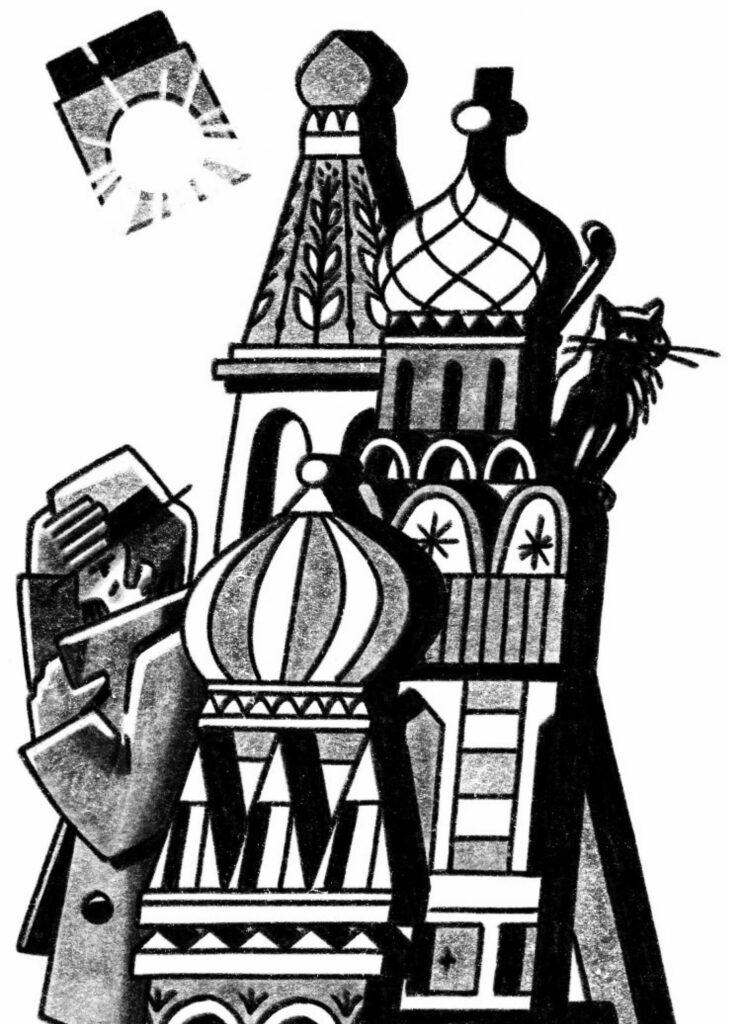Announcing itself in the spirit of the Cold War thriller, act I of Jonathan Garfinkel’s debut novel sees a Fulbright Student from the United States, Gary Ruckler, arriving at Moscow State University in 1974, there to “follow in the footsteps of my literary idol, Mikhail Lermontov, author of A Hero of Our Time. A novel ahead of its time, a book whose passages consumed me.” As he dreams of becoming a writer himself, Gary is roped into the life of Aslan, a thirty-five-year-old Chechen student studying genetics and selling Wrangler jeans on the black market. Soon we meet more of the cast, including Gary’s beautiful classmate Anna Litvak; her giant, boisterous boyfriend, Zaza; and Igor, a “literature enthusiast” and “Perfect Young Communist.”
After a period of vodka, suspicion, and clichéd conversation about freedom, things take their inevitable turn. Aslan and Zaza disappear to Georgia, and Igor (a likely spy) tasks Gary with bringing them back to Moscow. But instead of locating them, he finds a bloodstained rope and a caged rat in a church: “Quickly I ducked out the back door and began my descent down the mountain toward the village. I did not look back.”
Dangling from this cliffhanger, In a Land without Dogs the Cats Learn to Bark shifts gears from espionage caper to coming-of-age story, from Moscow in 1974 to Tbilisi in 1989. Tamar and Davit, two young, politically naive Georgians, are caught up in the anti-Soviet protests and the ensuing military crackdown that came to be known as the Tbilisi Massacre. In Tamar, we find the closest thing this book has to a centre. We follow her for the next eleven years, as she becomes a controversial performance artist, marries Davit (a closeted gay man), and decides to relocate to Toronto to teach her own brand of non-violent protest.
For all the problems in the Baltics, Ukraine, Belarus, even Armenia, the Georgian unravelling was horrifyingly dramatic. In a manner of two years, it went from one of the richest countries in the Soviet Union to a totally failed state. Tamar watched as three wars erupted: one by the sea, one in the mountains, and one in the streets of Tbilisi. Stories of war crimes blossomed amongst neighbours like cancer. Hundreds of thousands were internally displaced. The Papidoulas fled to Greece — a country they had never been to before — on flotillas sent by the Greek government. The Abkhaz reclaimed their land and drove out the ethnic Georgians. Rivers of refugees flowed up mountains and into the cities. The Sukhumi Football Massacre, the Zugdidi Assault, rows of mines planted in fields like so many flowers.

Clearly written with film adaptation in mind.
Gwendoline Le Cunff
Such passages are informative, dramatic even, but they do not reflect the way people speak of their own country.
Tamar’s story ultimately leads directly back that of Gary, Aslan, and Zaza. To make the connection, Garfinkel must call upon memories, which for all intents and purposes are flashbacks. These, however, bear too much weight and are practically impossible. In one example, Tamar somehow recalls a complete story she was told as a two-year-old. Later, she remembers waiting for her father, “abandoned a second time before he returned, this time in a car. She remembers the front passenger seat, crying at the light as she uttered her first word in Georgian: mama.” The effect tends to trivialize the textured history that helps to define Tamar.
Act III takes us to Toronto (where the author himself lives), and here the book is on firmer ground. It’s 2003, and we meet Joseph, who is earning his MBA and hoping “to get a job at a top firm on Bay Street and become a hedge fund manager.” His mother, Rachel Grabinsky, a public intellectual, political writer, and friend to Tamar, has just passed away. Their mother-son relationship, we learn, was a distant one at best. After the rabbi insists that Joseph give a speech at the funeral, he “starts to put pen to paper, but he doesn’t know where to begin. So he pours himself another drink and passes out in his chair.”
With clearer, more lucid writing, the novel gravitates away from Tamar and toward Joseph, while building trust with the reader. The smaller details offered for each of their lives are simply more believable at this point. “Tamar cares about history,” Garfinkel writes in act II, “but she feels most alive when she smells chlorine on her skin.” By act III, Garfinkel appears to have forgotten her love of swimming, though he shows the ways in which Joseph, who as a ten-year-old was taught by Noam Chomsky “how to make a dry Bombay martini with olives,” continues to swim in alcohol daily.
It seems pretty obvious that this is a novel written with film adaptation in mind. The scenes are cinematic, the dialogue is straight from television, and the best characters are those that approach caricature, like Aslan and Levan, the gun-running, sociable brother of Tamar. As a thriller — travelling through Canada, Georgia, Russia, and Turkey, chopping through chapters at a perfect rate — In a Land without Dogs the Cats Learn to Bark is an entertaining, sometimes funny book, perhaps more Graham Greene than John le Carré. “I have car sickness,” Joseph complains at one point, roaring through Tbilisi in a stranger’s Lada. “Me too, my macho male sibling,” the driver replies, “I am addicted to speed.”
Like that Russian car, Garfinkel’s novel is at its best at high speeds, twisting through city streets and dirt tracks. Unfortunately, when the engine inevitably cuts out, the city begins to look more like a two-dimensional set.
Connor Harrison lives and writes in Montreal.

